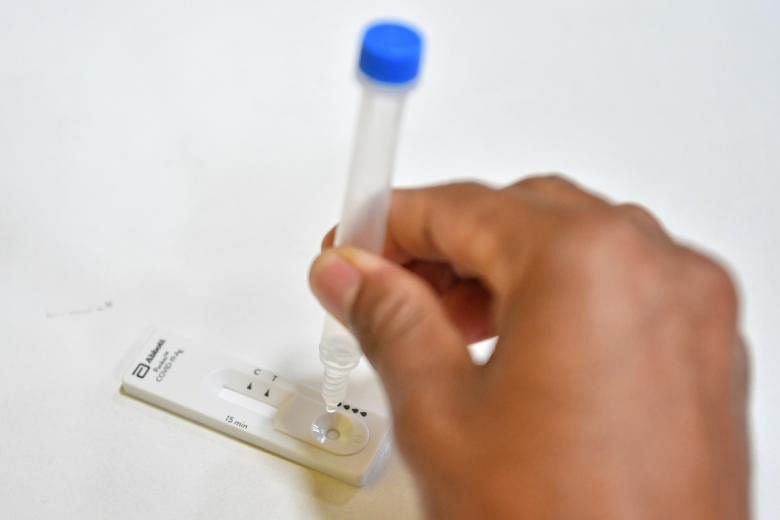SINGAPORE - Some people infected with Covid-19 and recovering from home have voiced concerns about being unable to isolate themselves at home safely.
There are also worries about infecting family members while waiting for instructions from the Ministry of Health.
The Straits Times addresses some of these concerns.
Q: Am I endangering my family members while recovering at home?
A: Not if they are all fully vaccinated, said Professor Ooi Eng Eong from the Duke-NUS Medical School's Programme in Emerging Infectious Diseases.
He said studies have found that vaccination reduces the likelihood of virus transmission within households, and protects against Covid-19 disease and severe illness.
Q: Are my elderly family members or young children at higher risk of getting the virus from me?
A: Vaccinated members of the family - including the elderly - should be well protected, said Prof Ooi. Still, it would be useful for those eligible to get their booster jabs.
Children appear to develop mostly mild disease when they are infected, he noted.
Home recovery is not offered to Covid-19 cases who have household members above the age of 80, or who are pregnant, have compromised immune systems or have multiple comorbidities.
Q: What precautions should I take?
A: "To further reduce the likelihood of transmitting the virus to other members of the household, people with symptomatic infection can distance themselves from the rest of the family as far as possible," said Prof Ooi.
This is especially important, as coughs and sneezes from those with symptoms can expel the virus from the airway to infect others, he added.
"Standard hygiene measures, such as regular hand washing and mask wearing, remain useful to further reduce the likelihood of transmitting the virus to household members," said Prof Ooi.
Prof Teo Yik Ying, dean of the National University of Singapore's Saw Swee Hock School of Public Health, said that the risk of spread is much higher if toilets are shared.
He added that one way of reducing the risk would be to ensure that the toilet bowl is covered prior to flushing, and common surfaces such as the sink, toilet bowl and shower handles are disinfected each time after the infected person uses the toilet.
Prof Ooi said that it would be useful to keep the toilet well-ventilated and the shared surfaces clean, in addition to proper hand-washing and mask wearing.
Q: What should I do if I start to develop symptoms while waiting to be sent to a community care facility?
A: "If any runny nose, dry throat, cough, body aches or fever develops, please see your doctor as soon as possible," said Dr Lee Joon Loong, medical director of Paddington Medical Clinic in Bedok.
Whether it is to seek treatment or to get a polymerase chain reaction (PCR) test, call the clinic beforehand to give staff a heads up, he added.
Dr Lee said those who are asymptomatic should monitor their health carefully, especially as symptoms develop between four and seven days after exposure to the virus.
They should take an antigen rapid test every other day if they are worried, he added.
Q: What are some signs that my symptoms are worsening and when should I go to a doctor?
A: Dr Lee said that these signs include shortness of breath, chest tightness and high fever that does not get better after taking medication.
Pulse oximeter readings would also show low oxygen saturation levels of below 96 per cent.
He suggests getting advice from your general practitioner first before heading to the hospital.
Q: What should I do if I'm a household member of a Covid-19 case, but I wasn't issued a quarantine order?
A: Prof Teo suggests strictly minimising moving about in public spaces as much as possible for at least two weeks, and to do a self-test if you have to leave the house during this time.













